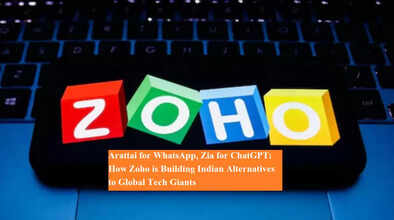Arattai for WhatsApp, Zia for ChatGPT: How Zoho is Building Indian Alternatives to Global Tech Giants

Indian tech company Zoho is steadily positioning itself as a strong contender against global technology giants by offering homegrown alternatives to widely used international apps. From messaging platforms to AI assistants, Zoho has been quietly building an ecosystem of products that aim to reduce dependency on foreign apps.
Arattai: An Indian Alternative to WhatsApp
When it comes to instant messaging, WhatsApp dominates the Indian market with over 500 million users. But Zoho is challenging this monopoly with Arattai, its secure messaging app that promises end-to-end encryption, privacy-focused features, and seamless communication.
Unlike WhatsApp, Arattai emphasizes data security and ensures that user information is stored in India. The app offers text, voice, and video messaging, along with group chats and file sharing—features familiar to WhatsApp users, but with a stronger emphasis on privacy.
For Indian businesses that are increasingly worried about data sovereignty, Arattai is emerging as a promising alternative.
Zia: Zoho’s Answer to ChatGPT
In the rapidly growing world of AI assistants, ChatGPT has become a household name. However, Zoho is betting on Zia, its artificial intelligence-powered virtual assistant, to compete in this space.
Zia is already integrated across Zoho’s suite of enterprise products, helping users with data analysis, report generation, business insights, and natural language interactions. While ChatGPT has been adopted for a wide range of personal and professional uses, Zia’s strength lies in being deeply connected to Zoho’s ecosystem, making it more relevant for businesses that already rely on Zoho tools.
Experts believe that as Zia evolves, it could become a serious player in the AI market, offering localized solutions that global platforms often overlook.
Why Zoho’s Ecosystem Matters
Zoho isn’t stopping with Arattai and Zia. The company has built a wide range of tools—from Zoho Mail (as an alternative to Gmail) to Zoho Meeting (a rival to Zoom) and Zoho Docs (competing with Google Drive and Microsoft Office).
What makes Zoho unique is its “Made in India, Made for the World” philosophy. By offering privacy-first products with competitive pricing, Zoho is giving both individuals and enterprises more control over their data.
In today’s era of growing concerns about surveillance and data misuse, Zoho’s approach resonates strongly with users who want trustworthy digital platforms.
Global Dependency vs Local Innovation
For years, India has heavily relied on global apps like WhatsApp, Gmail, Zoom, and ChatGPT. But the rise of Zoho highlights a shift toward self-reliance in technology. With over 100 million users worldwide and operations in 180+ countries, Zoho is proving that Indian companies can build world-class technology products.
This also aligns with the Indian government’s vision of promoting digital independence and reducing reliance on foreign platforms for critical communication and business needs.
The Road Ahead
While Zoho’s products are steadily gaining attention, the challenge remains in convincing users to switch from platforms they are deeply embedded in. For example, WhatsApp’s dominance in India makes it difficult for any new app to replace it overnight. Similarly, ChatGPT’s wide adoption presents a steep challenge for Zia.
However, Zoho is playing the long game. By focusing on enterprise customers, data security, and localized solutions, the company is positioning itself as a credible alternative to Silicon Valley tech giants.
Conclusion
With Arattai as a replacement for WhatsApp and Zia as an alternative to ChatGPT, Zoho is proving that India has the talent and capability to create powerful digital ecosystems. The company’s growing suite of apps reflects not just competition with foreign platforms but also a vision of technological independence.
For Indian users, this means one thing: the future of digital communication and AI may not only be shaped in Silicon Valley but also right here in India.

